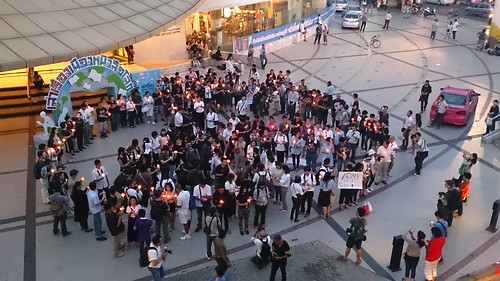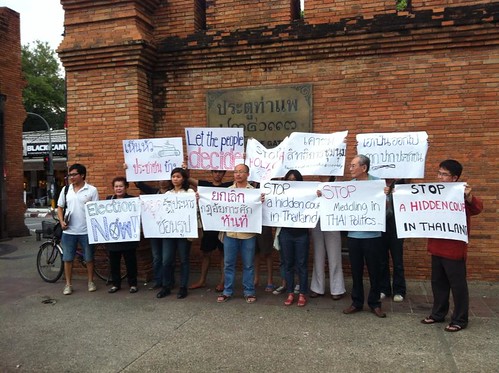A university in northern Thailand has issued an order prohibiting students and staff from expressing political opinions or carrying out political gatherings, amidst some protests against martial law in Bangkok, Ubon Ratchathani and Chiang Mai provinces.
The order followed the army’s enactment of martial law on Tuesday that prevents academics or government officials from expressing on all media political opinions that can cause “misunderstanding” and “rifts”.
A planned public seminar by Chiang Mai University's faculty of law on martial law was also cancelled on Wednesday, because the organizer was not allowed to use the university's facility.
 Candlelit vigil at the Bangkok Art and Cultural Center opposing martial law
Candlelit vigil at the Bangkok Art and Cultural Center opposing martial law
At least 14 television stations have also been ordered to close down since Tuesday, along with six community radio stations.
After the northern region army commander summoned senior government officials to ask for “cooperation” on Tuesday, the Rector of Naresuan University in Phitsanulok Province prohibited its staff and students from taking part in political activities or giving interviews to the radio or television.
Despite the prohibition, dozens of academics and students in Chiang Mai, including the renowned historian Nidhi Eowsriwong, gathered at Thapae Gate at the city centre, and held placards opposing coups and martial law. Similar events were held at Ubon Ratchathani University and the Bangkok Art and Culture Centre in Bangkok on Tuesday evening.
 Gathering in Chiangmai opposing martial law
Gathering in Chiangmai opposing martial law
Martial law, a 100-year-old law used in war situations, gives the army supreme power to shut down radio stations and television channels and to search or detain any person up to seven days, among other measures to “control peace and order.”
Kinokuniya, one of the biggest bilingual bookstores in Thailand, decided to take a number of books on Thai politics off the shelves, citing the need to follow the army’s announcement. The Kinokuniya store representative told Prachatai that they chose to remove books that contain “political conflict” deemed causing “rifts” in society.
The store did not name the titles taken down, but sources said that some were historical books about the Free Thai Movement in World War II, among other academic analyses of Thai politics.
Meanwhile, an activist bookstore in Chiang Mai was greeted by different groups of police and soldiers Wednesday morning. The store’s owner was warned not to hold any activity or discussion about the situation, or she would be detained at an infantry barracks for up to seven days.
Rodjaraeng Wattana, owner of Book Re:public, a bookstore known for its frequent public forums about political and social issues, said she was told that if any public discussion took place, the soldiers would have to secure the store.
“We know that we have been on the ‘watch list’ for a long time. Now that martial law is declared, it’s certainly automatic that we would be threatened like this," she said.




